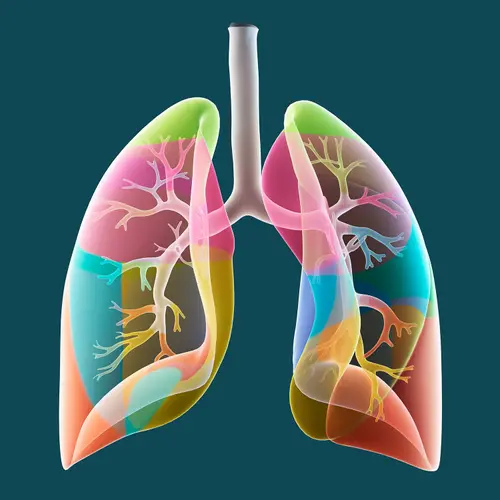When you have lung cancer, you could get complications like blood clots or chest pain, especially as your disease gets more advanced. There are a number of ways to treat these problems and feel more comfortable.
Shortness of Breath
Lung cancer sometimes spreads to the airways that bring oxygen into your lungs, causing the airways to narrow or get blocked. When this happens, it's hard for your lungs to fully expand when you breathe in and may cause shortness of breath called dyspnea. Lung cancer can also cause fluids to collect around your lungs and ribcage, which can make it hard to breathe.
You can try making changes to your lifestyle to manage your shortness of breath. For example:
- If you smoke, quit.
- Avoid secondhand smoke.
- Drink water (ask your doctor how much you should drink).
- Get rest.
- Practice slow, deep breathing.
- Eat healthy food.
Coughing Up Blood
Lung cancer can sometimes cause bleeding in your airways. This can make it hard for you to breathe and may cause you to cough up blood.
Treatment options depend on how much blood you're coughing up. If there's severe bleeding in your airways, it may cause you to choke. If this happens, get medical attention right away.
Chest Pain
About 20% to 40% of people with lung cancer may have chest pain. It happens when the tumor in your lung causes tightness in your chest or presses up against nerves. How severe the pain is varies from person to person.
Usually, you'll feel pain in the lung where the tumor is located. It may feel like a dull and continuous ache in your chest cavity. It might be worse when you cough, laugh, or take a deep breath.
If your chest pain is affecting your everyday life, ask your doctor about ways to manage and control your discomfort.
Pleural Effusion
Lung cancer can cause fluid to collect in the space between the lungs and your chest wall. This is called pleural effusion and affects about 15% of people with lung cancer. Too much fluid can make it hard for the lungs to fully expand when you breathe in and lead to shortness of breath or pneumonia.
Pleural effusion usually happens in the later stages of lung cancer. Ask your doctor about ways to treat it. One option is thoracentesis. Your doctor uses a needle or catheter to drain the excess fluids in your chest cavity. This may give you some relief, help you breathe better, and lower the chances of it happening again.
Superior Vena Cava Syndrome
Sometimes the cancerous tumor in your lung can grow into, press against, or block one of the large veins in the chest called the superior vena cava. This is called superior vena cava syndrome and happens to about 2% to 4% of people with lung cancer. It's more common in people with a type of lung cancer called small-cell lung cancer.
The blockage may cause blood to back up in other veins around it, in the chest wall, and in the upper body. Because of the blockage, veins may get larger, which can lead to swelling in your chest, neck, and face. This can be painful and make you feel short of breath or flushed.
Pressure on the veins may cause shortness of breath, headache, blurry vision, dizziness, and drowsiness. The symptoms can feel worse if you lie down or bend forward.
In rare cases, this syndrome can be life threatening.
Blood Clots
When you have lung cancer, it's common to have blood clots. If you develop thrombocytosis, your body could make too many platelets, a type of blood cell that helps you stop bleeding by forming a clot.
It can be risky to have too many platelets. It can lead to clots in blood vessels that can cause strokes or heart attack. Usually, thrombocytosis happens in people with late-stage lung cancer. But like many people with cancer, it's common to have blood that clots more easily, which raises your chances for dangerous blood clots.
Fluid Around the Heart
If the tumor grows into the middle of the chest or presses against the area near the heart, it may affect how well your heart works. Sometimes, it can block one of the tubes carrying blood to the heart and may lead to abnormal heart rhythms. It might also cause fluid to build up in the sac surrounding the heart.
To treat it, your doctor may use a needle to slightly puncture the sac and allow the fluid to drain. This treatment is called pericardiocentesis.
In some cases, your doctor may surgically remove the fluid and let it drain in the chest or belly. This may reduce the chances of the fluid building back up around the heart.
Hypercalcemia
When you have hypercalcemia, the calcium levels in your blood may be higher than normal. If you have lung cancer, you may be more likely to get this condition.
Hypercalcemia may happen when the cancer in your lungs spreads to your bones. The bones may leak calcium into the blood. Too much calcium in your blood may cause bones to become weak and easy to break. It may also cause back or hip pain.
In one lung cancer study with over 1,000 participants, about 6% had hypercalcemia. Usually, hypercalcemia happens in people who have stage III or stage IV lung cancer. It can also rarely happen when your cancer makes hormones that may cause calcium to build up in your blood.

